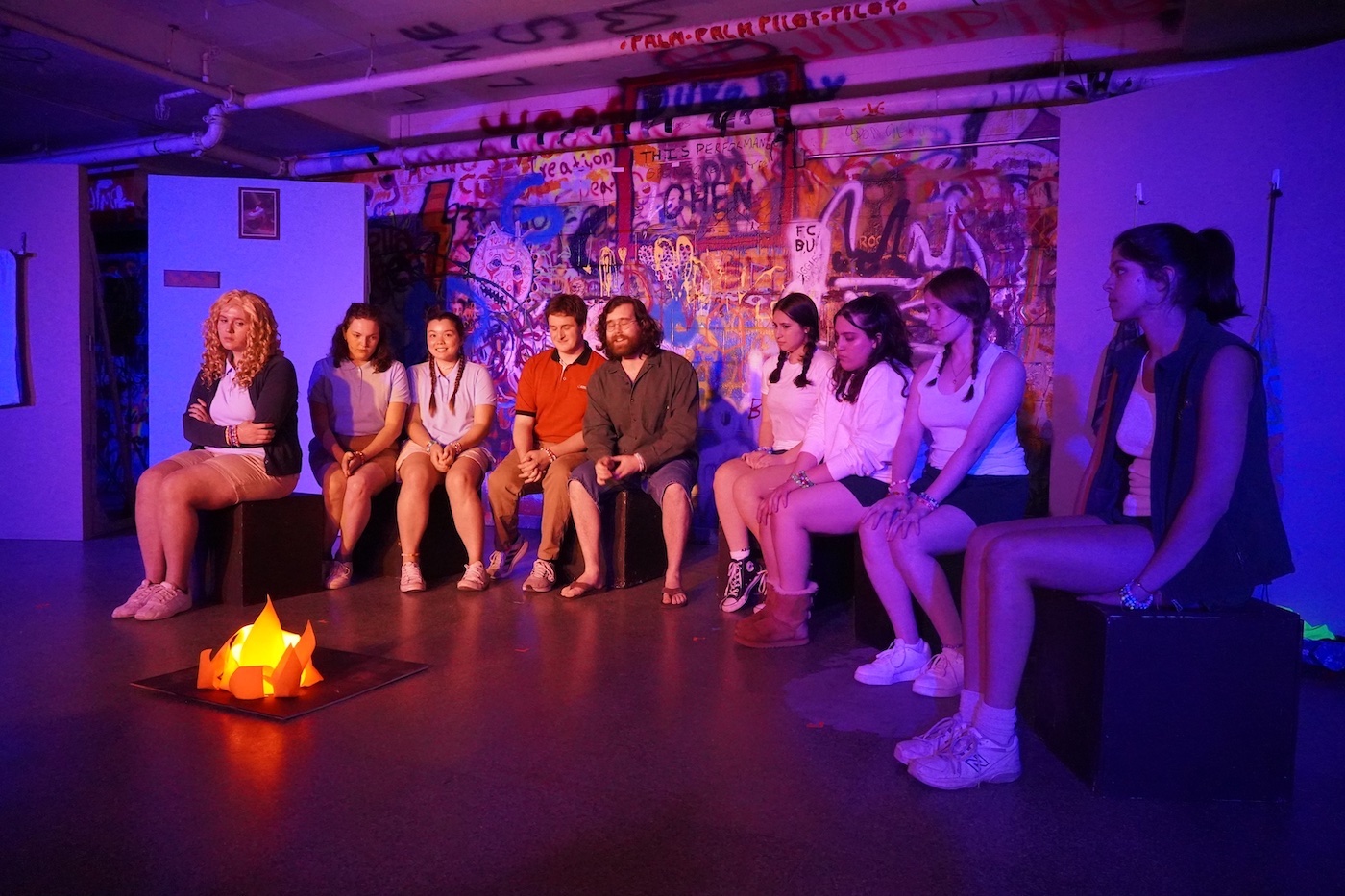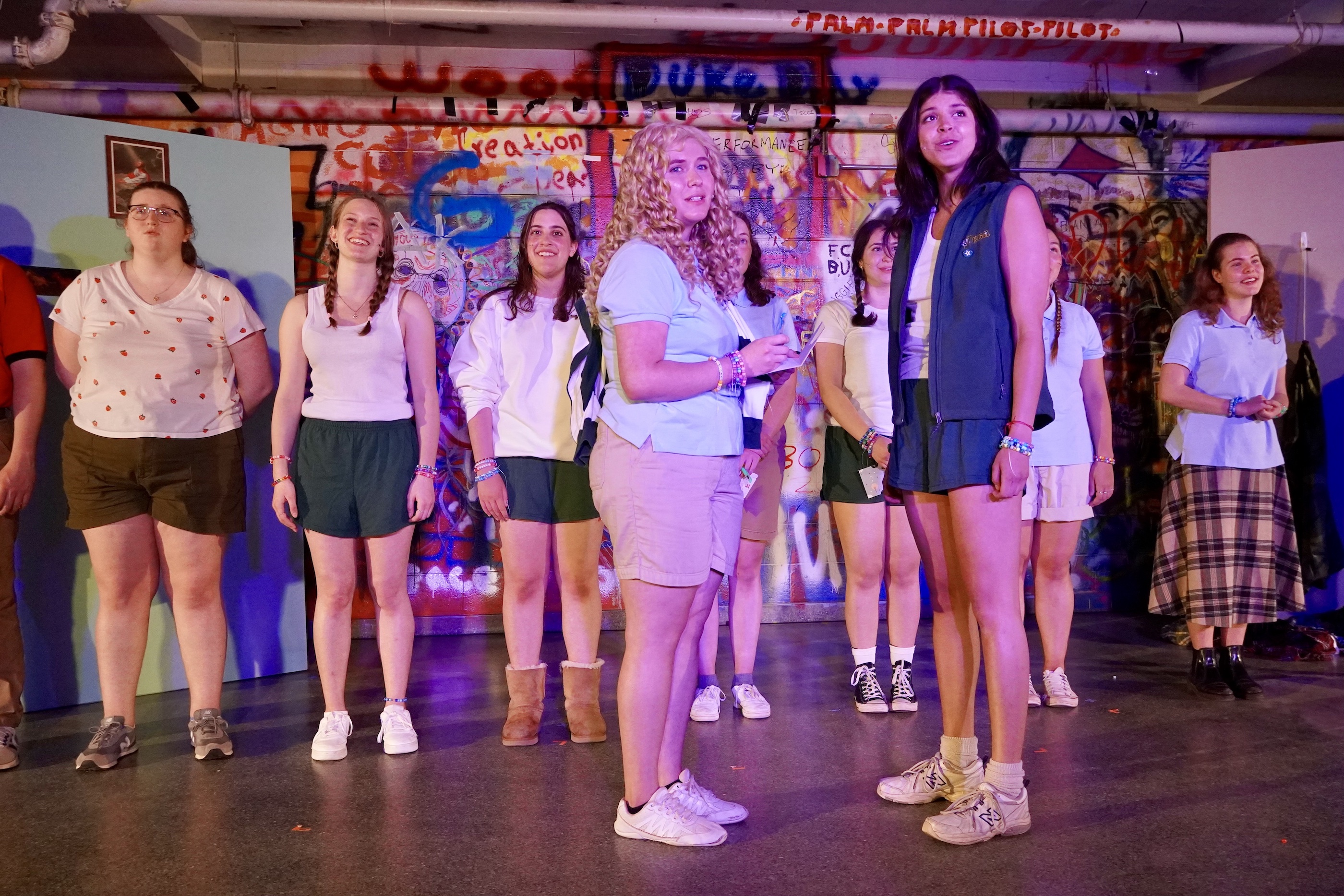
c/o Amanda Swartz
If you’ve ever been to sleepaway summer camp, then the original musical “Camp!” written by Eliza Bender ’24 and Sarah Linsly ’24 would surely prove nostalgic. From writing letters home to pool time, first kisses, communal showers, and pranks, this musical captures what it means to return to summer camp year after year. “Camp!” hosted a packed house at all three of its performances on Friday, April 12 at 7 p.m. and Saturday at 2 p.m. and 7 p.m. in WestCo Café. With the support of Spike Tape, Bender and Linsly used their show, inspired by both of their experiences at camp growing up and filled with witty quips and dynamic musical numbers, to sing a story of “girlhood, gayhood, religion, and summer camp.”
The opening scene stars all of the campgoers at both Camp Tevah Tov, a Jewish summer camp, and Camp Crossroads, an Evangelical camp. Both are all-girls and located across a lake from one another. Camp Tevah Tov is attended by Shira (Jamie Sloves ’27), Ariel (Abigail Grauer ’27), Dahlia (Shanti Hinkin ’26), and Romi (Danielle Nodelman ’24), and the Camp Crossroads posse consists of Faith (Julia Borden ’26), Agnes (Hannah McKiernan ’24), and Marianne (Sarah Linsly ’24). After the opening number, in which all of the girls write home to their families about their respective camp experiences, the audience is transported to a bunk at Camp Tevah Tov, where Shira hands out mail and the girls all swoon over a love letter written to Dahlia by Benji, her pen pal and star-crossed lover at Camp Meedbar. As Dahlia retells the story about how her parents met years ago at Jewish summer camp, she sings “Just Like Everything’s Supposed to Be,” saying that she is destined for the same happy ending and knows that Benji is the one for her, foreshadowing a possible interruption to their romance.

c/o Amanda Swartz
Over at Camp Crossroads, a serious Marianne lectures her friends on their impure thoughts, and it becomes clear to the audience that she leads the group and is very dedicated to her faith. There is also an element of foreshadowing to Marianne’s devout beliefs—at this point the audience may begin to wonder if something will transpire this summer that will make her question them and herself. At the end of this scene, the girls learn that Bible Study Under the Stars is canceled due to an impending storm, and soon after the singing of “God Does Things To Test Us” and “Shower Party,” the whole cast comes together for a number entitled “The Flood” as Camp Crossroads begins to fill with water. Overall, “Camp!” had a great speaking-to-singing ratio, and the original songs by Linsly drove both dramatic and humorous moments in the plot as well as quintessential summer camp moments that are best captured musically.
“There’s a famous quote that’s like, ‘We sing because we can no longer speak,’” Linsly said. “So you’ll often find song in intense moments of emotion because it’s the best way to express the inner self of the character. And sometimes it is also just about having fun.”
With Camp Crossroads flooded and Camp Tevah Tov intact, camp directors Pastor Chad (Noah Frato-Sweeney ’24) and Rabbi Moshe (Nat Wheeler ’25) decide to move all of the campers from the uninhabitable Camp Crossroads to Camp Tevah Tov. When Felicia (Zoe Nagle ’27), a Camp Tevah Tov counselor, announces to the girls that they will be sharing their bunk with strangers for the rest of the summer, the initial response is an indignant outcry from the campers. As Dahlia itemizes the stereotypes of Christian summer camp girls, Felicia insists that they will be able to make friends with the Camp Crossroads girls as long as they keep open minds.
Once in close quarters, Pastor Chad and Rabbi Moshe—alongside Felicia and Camp Crossroads Counselor Denise (Celeste Borletti ’25)—attempt to force the girls to bond by spending time around the fire and making friendship bracelets. Despite these efforts, tensions between Dahlia and Marianne ignite a prank war, in which each girl tries to one-up the other with forged letters, used tampons on pillows, maimed stuffed animals (described in song), and shaved eyebrows until Shira finally confronts Dahlia about the true motivation behind the excessive effort she and Marianne are putting into their feud. Shira asks whether Dahlia has feelings for Marianne, warning her about what people will think if she gives up her perfect future with Benji.
Eventually, the prank war is discovered by Felicia, who lectures Dahlia and Marianne and forbids them to attend the end-of-summer dance. Horrified at missing the opportunity to see Benji, Dahlia decides to go to the dance anyway, directly defying Felicia’s orders. Marianne, upset by Dahlia’s insistence on spending the night with Benji instead of her, follows her, and the two vie for his attention in the number “Look at Me, Benji.”
With both Benji and Marianne before her, Dahlia fully realizes and admits her feelings for Marianne, who, to an eager audience’s relief, reciprocates her affection. The two share a long-awaited kiss as Dahlia assures Marianne that embracing her identity and her commitment to her faith do not have to be mutually exclusive. As the musical ends, more than one of the girls has a reinvigorated, expanded, and more dynamic understanding of how to embrace themselves while still holding onto their beliefs. The show closes with a reprise of the opening number during which the girls become pen pals and write to their new camp friends.
Bender expressed her pride in the show’s depicting of queer adolescence in a way that hadn’t been done before.
“I think the ending, to me, is this really nice ending because it gets at the heart of something that I think is at the heart of queerness, which is that not everything has to be this perfect thing that makes sense,” Bender said. “I like that these two characters may never meet again, but they’re still incredibly important to one another.”
On the whole, “Camp!” was an entertaining and heartwarming production and an inventive way to combine themes of queerness and girlhood in the unique setting of religious summer camp, which had a personal significance for many involved with the show. The writers’ and performers’ connections the show were what made it special. Numerous cast members had gone to either Christian or Jewish summer camp and found that the script paid an endearing homage to this core experience growing up.
“I loved their concept so much because I went to Orthodox Jewish summer camp,” Grauer said. “I was there and I had a secret iPod touch, which is in the script…. So much of it, like the shower party, is so specific and only someone who is a girl that went to summer camp can tell you about it.”
For Bender and Linsly, exploring the theme of queerness within these spaces was also extremely important because each of them went to a religious summer camp, and they identify as bisexual and lesbian, respectively.
“It’s queerness in the context of where you grew up,” Linsly emphasized. “And so for me, growing up super Christian, [queerness was] obviously not tolerated, especially in the space of an Evangelical summer camp, but we knew it was important because it’s a real story and people experience that in those spaces. And so it’s important to share it and talk about it and write about it because it’s sad, but it’s also beautiful.”
While the story told by “Camp!” was inspired by the writers’ own experiences, the actors were also given creative freedom in their performances and stage presence. Overall, the sets were straightforward and not overdone, including a set of pipe and cloth shower curtains for the shower party and a blue sheet representing the Camp Crossroads flood. Simple transitions distinguished the different locations and scenes without taking away from the acting itself. The setup of the stage accentuated the physicality and movement choices made by the actors.
“They gave us a lot of agency with that just because a lot of the blocking for the scenes was very simple because, you know, we’re just 12-year-old girls at camp,” Sloves said. “More of their notes were in terms of character.”
It was clear to see how much fun everyone was having performing onstage and how close the cast was. “Camp!” was the first show more than one member of the cast had done at the University, and the liveliness and originality of this piece made it a special experience for these actors.
While musical theater has been a constant in Nagle’s life since middle school, most of the productions she participated in fell into the realm of classical musical theater. She mentioned that the originality of “Camp!” and the small size of the cast drew her to the musical.
“It was cool because the songs felt really new and fresh and fun to sing,” Nagle said. “It was my first musical that had such a [small] cast, and I thought it was really integral to telling the story because I think it gave the audience more opportunities to sit with the characters and really enjoy themselves.”
Holding the performance in WestCo Café also allowed the cast to more intimately interact with the audience. This let them build on audience feedback and feel more closely connected to viewers’ energy.
“I think it really just welcomes the audience into the reality of being a student writer and performer,” Linsly said.
The personal ambiance created in WestCo Café proved to be the perfect environment for an original musical that was so near and dear to its creators.
“It’s scary because even if it’s not your ideas, as in you’re not the one who’s written it, it’s still so vulnerable because you are bringing something…that is of yourself,” Linsly said. “It’s intimidating to really put yourself out there and put your vision into the world. And I think it’s really beautiful that we were all able to do this collaboratively because theater is a collaborative art.”
The hard work put into the creation and production of “Camp!” was evident in its performance. It was truly a testament to the vibrant creativity that flourishes on campus and the stories that students continually integrate into their art.
“It was such a beautiful process to come together with everyone and make something totally new,” Linsly said, looking back on the whole journey. “So much work went into this, not only that I did, not just that Eliza did, but truly that everyone in this production did, including pit musicians, crew members, actors, members of Spike Tape. So it literally takes a village to raise a musical.”
Langley Maciejewski can be reached at lmaciejewski@wesleyan.edu.